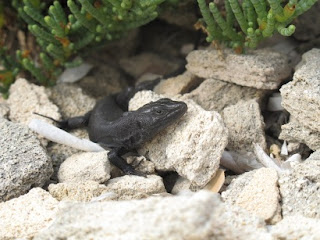2023. Insular holobionts: persistence and seasonal plasticity of the Balearic wall lizard (Podarcis lilfordi) gut microbiota. PeerJ 11:e14511 https://doi.org/10.7717/peerj.14511
Summary:Background: Integrative studies of animals and associated microbial assemblages (i.e.,
the holobiont) are rapidly changing our perspectives on organismal
ecology and evolution. Insular vertebrates provide ideal natural systems
to understand patterns of host-gut microbiota coevolution, the
resilience and plasticity these microbial communities over temporal and
spatial scales, and ultimately their role in the host ecological
adaptation.
Methods:Here we used the endemic Balearic wall lizard Podarcis lilfordi
to dissect the drivers of the microbial diversity within and across
host allopatric populations/islets. By focusing on three extensively
studied populations/islets of Mallorca (Spain) and fecal sampling from
individually identified lizards along two years (both in spring and
autumn), we sorted out the effect of islet, sex, life stage, year and
season on the microbiota composition. We further related microbiota
diversity to host genetics, trophic ecology and expected annual
metabolic changes.
 |
| Photo: G. Tavecchia |
Results:All the three populations showed a remarkable
conservation of the major microbial taxonomic profile, while carrying
their unique microbial signature at finer level of taxonomic resolution
(Amplicon Sequence Variants (ASVs)). Microbiota distances across
populations were compatible with both host genetics (based on
microsatellites) and trophic niche distances (based on stable isotopes
and fecal content). Within populations, a large proportion of ASVs
(30–50%) were recurrently found along the four sampling dates. The
microbial diversity was strongly marked by seasonality, with no sex
effect and a marginal life stage and annual effect. The microbiota
showed seasonal fluctuations along the two sampled years, primarily due
to changes in the relative abundances of fermentative bacteria (mostly
families Lachnospiraceae and Ruminococcaceae), without any major
compositional turnover.
Conclusions:These results support a large resilience of the major compositional aspects of the P. lilfordi
gut microbiota over the short-term evolutionary divergence of their
host allopatric populations (<10,000 years), but also indicate an
undergoing process of parallel diversification of the both host and
associated gut microbes. Predictable seasonal dynamics in microbiota
diversity suggests a role of microbiota plasticity in the lizards’
metabolic adaptation to their resource-constrained insular environments.
Overall, our study supports the need for longitudinal and integrative
studies of host and associated microbes in natural systems




No comments:
Post a Comment
Note: only a member of this blog may post a comment.